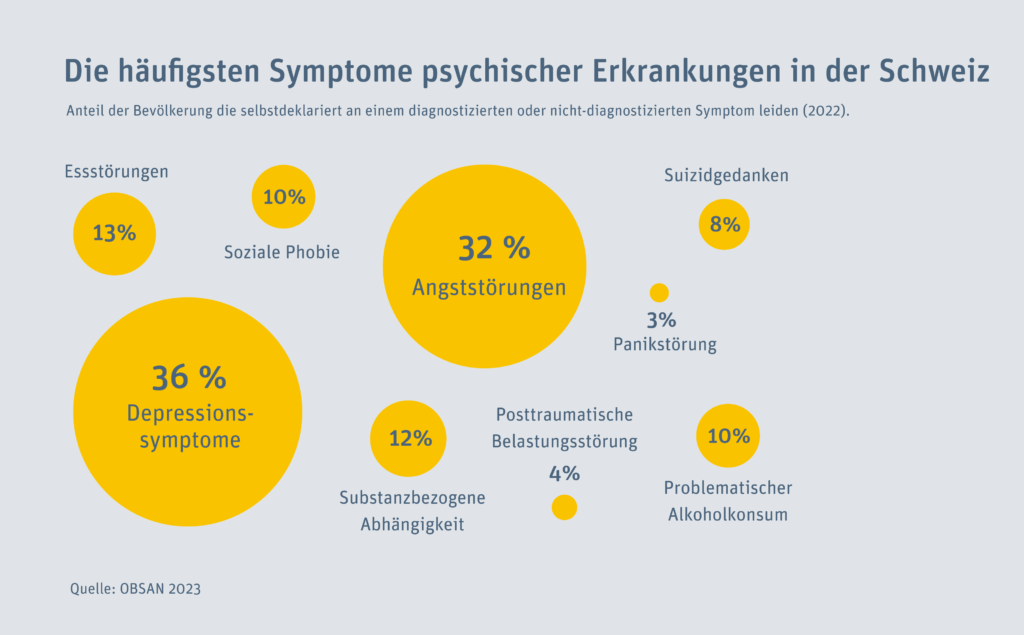Helsana: Mental illness in Switzerland between progress and stigma
10 März, 2025 | Aktuell Nicht kategorisiert
Mental illness is an increasingly important social issue in Switzerland. Despite progress in treatment and education, prejudice and taboos remain widespread. While Switzerland is considered exemplary in many areas of psychiatric care, there is also a tension here between modern therapeutic approaches and the ongoing stigma surrounding mental illness.
The latest figures on mental health paint a bleak picture: according to the Swiss Health Observatory OBSAN from 2023, around a third of the Swiss population suffers from mental health issues. Mild to severe depression and anxiety disorders are the most common symptoms.
The increase in mental illness among children and adolescents is worrying: a 2022 study by the University of Zurich shows that around 20 % of young people between the ages of 12 and 19 suffer from mental health issues. The COVID-19 pandemic has exacerbated this trend, as isolation, school closures and fears for the future have weighed heavily on many young people.
Despite these alarming figures, psychiatric care in Switzerland is comparatively well developed. There are numerous specialised clinics, outpatient therapy services and low-threshold counselling centres. However, even in this country, those affected struggle with prejudice and shame. Many are afraid to seek professional help for fear of discrimination or social exclusion.

The legacy of psychiatric history
Like Germany, Switzerland also has a troubled history of psychiatry. Until well into the 20th century, people with mental illnesses were isolated in institutions, often in inhumane conditions. The practice of forced sterilisation and castration, which was legal in Switzerland until the 1970s, is another dark chapter. Those affected, who were considered ‘incurable’ or ‘hereditarily ill’, were systematically deprived of their rights.
Today, Switzerland is actively addressing this past. Museums such as the Psychiatry Museum Bern offer insights into the history of psychiatric care and raise public awareness of the progress, but also the mistakes of the past. Such institutions make an important contribution to destigmatising mental illness.
Modern approaches and challenges
Switzerland today relies on patient-centred and integrative psychiatry. Modern therapeutic approaches such as cognitive behavioural therapy, trauma-informed treatments and the use of digital health services (e-mental health) are gaining in importance. Collaboration between psychiatry, general practitioners and social services has also improved significantly in recent years. In the University Psychiatric Clinics Basel, some cases allow dogs.
Nevertheless, there are still challenges. Waiting times for therapy are often long, and specialised services are lacking in rural areas. Furthermore, funding for psychiatric treatment is not always sufficient, which can lead to bottlenecks in care.
Reducing stigma through education
To reduce the stigma associated with mental illness, Switzerland is focusing on education and public awareness campaigns. Organisations such as Pro Mente Sana and the Health Promotion Switzerland foundation are actively committed to raising public awareness. Schools, workplaces and local communities are increasingly being involved in prevention work.
One example of an innovative approach is the ‘How are you?’ project in the German-speaking cantons. This campaign encourages people to talk openly about mental stress and offers practical support for everyday life. Digital platforms such as ‘Baige’ also offer online platforms for mental support and therapy for people with mental health problems.
There is still work to be done
Switzerland has achieved a great deal in the field of psychiatric care, but there is still work to be done. While medical and therapeutic care is of a high standard, social acceptance and financial support need to be further strengthened. Museums, awareness campaigns and modern therapeutic approaches are important steps in breaking the taboo surrounding mental illness and enabling those affected to live a life free of stigma. As indicated at the media conference held by Helsana on 4 March, the health insurer will be refocusing on mental health services.
Switzerland is showing that progress is possible – but only if society is willing to confront its fears and prejudices. Mental health is not a fringe issue, but a central component of human well-being. It is up to all of us to raise awareness and support those affected.
Binci Heeb
Also read: Video #4: Florence von Gunten, psychologist




